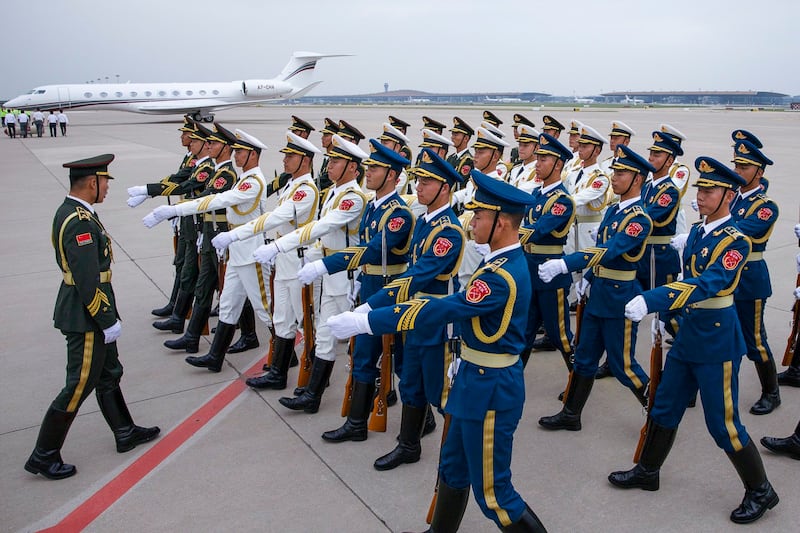Leaders of African countries are arriving in Beijing this week for a China-Africa summit, at which President Xi Jinping is expected to lay out his idea of a "shared future" with African nations, underpinned by Chinese demand for minerals and political support from Global South nations.
On the second day of the Forum of China-Africa Cooperation, which runs Sept. 4-6 in the Chinese capital, Xi is expected to call for higher-quality, "green" investments, as China backs away from its earlier readiness to bankroll major infrastructure projects in favor of more sustainable public-private partnerships.
China remains keen to boost trade and gain access to raw materials from the continent, including copper, cobalt and lithium from Botswana, Namibia and Zimbabwe. But following debt restructuring agreements with Chad, Ethiopia, Ghana and Zambia, the country will likely proceed with more caution when it comes to the big loan packages that were a feature of pre-pandemic cooperation.
African countries remain the primary focus of Xi's flagship economic cooperation program. Yet Xi's Belt and Road Initiative has been widely criticized for ensnaring poorer countries in "debt trap" diplomacy, with Beijing wielding most of the power in partnerships that offer scant gains for local residents.
Critics say China's approach to its economic and trade partners in Africa remains colonial and extractive, and Beijing will want to try to shift that narrative at this week's forum.
Why is China-Africa cooperation so important to Xi Jinping?
For Xi, it's not just about trade and economic ties. There are big political gains to be made too.
Foreign policy under Xi's rule, now likely indefinite, has been about reshaping the U.S.-dominated international order to more closely reflect China's needs and priorities, including exporting a more authoritarian model of governance to countries under Beijing's political influence.

Under Xi's vision, a rising China will spread its wings (in Chinese) and influence globally, to the point where Beijing becomes a rule-maker rather than a rule-taker, as it starts to chafe under the U.S.-led "rules-based international order."
For that to happen, it needs other, often poorer, countries to accept its rules and act as its allies in international institutions, including organizations under the aegis of the United Nations.
Xi Jinping Thought, which has been enshrined in the ruling party charter since 2022, describes this as "reform to the global governance system," which according to the government's China International Development Cooperation Agency, is at a " historical turning point."
"While China has always pursued global preeminence, it initially sought to be unobtrusive and progress stealthily with a low profile," according to a 2023 analysis by Paul Nantulya of the Africa Center for Strategic Studies.
"The Chinese Communist Party has signaled that the era of discretion is gradually being replaced with a bolder and more assertive approach."
How extensive is China's presence in Africa?
Beijing's United Front outreach and influence operations in the continent seem to be working. African countries are consistent supporters of Beijing at the United Nations, voting Chinese nationals into top jobs at several U.N. agencies and backing attempts to rewrite the rulebook on human rights, while excluding democratic Taiwan.
And a Pew Research poll from 2023 revealed that Beijing gets its highest international approval ratings from Nigeria, Kenya and South Africa.
"China’s quest to 'reform' international governance has found willing partners in the Global South, including Africa, which has played no small part in advancing China’s international project," Nantulya writes, warning that Chinese influence can also pose a challenge to "core African norms" and commitments on constitutionalism, human rights and democracy.

However, China’s efforts to selectively reshape the workings of the international system -- including its human rights system -- can also undermine core African norms and commitments such as those on constitutionalism, human rights, and democracy, he warns.
As a BRICS nation, South Africa has signed up for China's New Development Bank to offer an alternative to the World Bank, while several African countries have joined its Asia Infrastructure Development Bank since its founding in 2015.
And Beijing's Global Security Initiative, a bid to export Chinese norms and security priorities, was incorporated into an action plan adopted at the last China-Africa summit in Dakar.
In recent years, China has persuaded Burkina Faso, Malawi, Liberia, Senegal and others to cut diplomatic ties with democratic Taiwan, a precondition of diplomatic recognition by Beijing.
What can we expect to see at the China-Africa summit?
According to state media, China and Africa will be launching projects with green and sustainable branding, including growing mushrooms using Chinese technology, biogas promotion and greenhouse cultivation.
Beijing also says it wants to "further increase Africa's capacity in realizing independent and sustainable development as well as help it accelerate poverty alleviation," the China Daily reported.
Xi Jinping's Belt and Road Initiative will also be a prominent feature of the forum.
Chinese companies have helped to build or upgrade more than 10,000 kilometers of railways, nearly 100,000 kilometers of highways, nearly 1,000 bridges and 100 ports, and 66,000 kilometers of power transmission and distribution lines in African countries, according to state media reports. They have also helped build a 150,000-kilometer backbone communications network.
But experts expect Beijing to move away from its previous focus on eye-watering infrastructure figures in favor of healthcare, sustainable development, the digital economy and innovation.
Chinese sovereign lending, once the main source of financing for Africa's infrastructure, is at its lowest level in two decades, according to Reuters.
Yet public-private partnerships, Beijing's preferred new investment vehicle globally, have yet to gain traction in Africa, the agency reported.
Chinese officials at this week's summit will be wanting to change that.
Edited by Malcolm Foster
